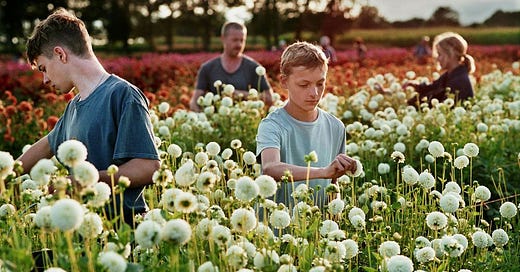Close (Dir. Lukas Dhont)
In a bright summer in Belgium, two thirteen-year-old boys share a friendship that only thirteen-year-old boys can share. They are Leo (Eden Dambrine) and Rémi (Gustav De Waele), innocent creatures who spend hardly a moment apart. They run through multicolored flower fields with smiles plastered across their faces. They stay over at each other’s houses, telling wild, winding stories to each other when they can’t sleep. Does this all sound a bit saccharine? Well, it kind of is, but when we train our eyes upon Leo and Rémi, such saccharinity feels genuine. At thirteen years of age, these kinds of blissful summers are as real as they come.
All of this is a stage-setter for Close, a deeply sad exploration of nascent manhood and its debilitating effects. This is writer-director Lukas Dhont’s second feature since 2018’s Girl, another coming-of-age tale that received much controversy for starring a cisgender boy in the role of a trans girl. While Close’s subject is much less contentious than its predecessor, it is just as sensitive. Dhont has a perceptive eye for childhood emotions, delivering a painfully honest film featuring two of the year’s best performances. His two teenaged stars are staggeringly good—Dambrine especially. The young actor’s turn as Leo is balanced and affecting, and deserves all the Oscar nominations he is sure not to get.
The film’s first section is its best, quietly tracing the contours Leo and Rémi’s beautiful friendship. Theirs is as pure as can be, and we see it expressed in striking, beautiful images: The two sleep side-by-side in the same bed as the sun comes rises; the two race each other on bikes to and from school. Dhont wisely directs the film with space for Dambrine and De Waele’s performances, which shimmer with the warmth of the sun. Perhaps the most affecting image in a film full of them comes at Rémi’s oboe recital: Leo, sitting in the audience, watches with unabashed encouragement at the sight of his best friend. A Spielbergian camera pushes slowly onto Leo’s face, and with that simple trick, we understand just how much love is shared between the two.
Once the summer ends, the boys return to school, and with that return comes expectation. Leo and Rémi cannot display the same kinds of physical intimacy without boys making fun of them, without girls pushing their buttons. “Are you together?” one girl asks, prompting an angry response from Leo: “We’re close because we’re best friends.” His hurt is evident, and, in a tragic act of self-denial, he begins to push Rémi away. He joins an ice hockey team to reaffirm his sense of masculinity, exchanging intimate physicality for a more brutish variety. The more Leo grows comfortable with these schoolyard boys, the more he distances himself from his old friend. Rémi, a truly innocent soul, turns towards self-destruction and violence.
Then, something happens. Saying what that something is would be to spoil the film, but suffice it to say that it is unexpected, and entirely reframes what was previously a particularly poingant study of emergent masculinity. It’s not that the film stops being that—Leo’s attempts to mesh with the other apes is as palpable ever—but rather that the event is so jarring that one cannot help but feel a screenwriter’s touch. More than that, there is the sense that the film wants to avoid the real consequences of Leo’s changing persona. His induction into the world of feral masculinity is the film’s most potent feature, yet a script written by Dhont and Angelo Tijssens leads us in a different direction.
Dhont, an eminently compassionate auteur, is perhaps working at too kind a register. He clearly cares for his characters—perhaps even to the extent that he is unable to see the film through to its self-evident conclusion. The film’s first act presents such an achingly tragic framework that when it dissipates in its second at the behest of an unexpected twist, there is a sense that the film has lost its way. The film turns towards more generalized tragic circumstances, sidelining the poingancy of Leo and Rémi’s impressively specific relationship.
Even then, Close remains immersive all the way through, with an audiovisual palette that centers us entirely in Leo’s shifting emotional state. Frank van den Eeden’s roving camerawork follows Leo with an immersive proximity in a manner reminiscent of his fellow countryment the Dardennes brothers; Valentin Hadjadj’s string-and-woodwind score adds affective depth to these stunning images. Dhont’s precise directorial vision unifies these elements with recurrent visual motifs, particularly of Leo working at his family’s flower farm. His work changes with the seasons, moving from flower picking to planting to harvesting; Close thereby displays an instinctive sense of Leo’s emotional development.
This, above all, is the reason to see the film. Dhont has documented a young boy’s formative years, a time in which he will come to understand what it means to grow up, with all the emotional destruction that entails. There are questions to be asked of the film’s writing, to be sure: Dhont’s unwillingness to see his characters at their worst is evident, and limits the film from its deepest insights. Yet Close is still magnificently expressive, sensitive to the remarkable complexities of childhood emotions. Few have the acuity, let alone the bravery, to tell such tales. —James Fahey



